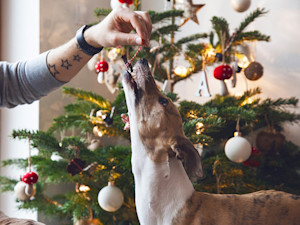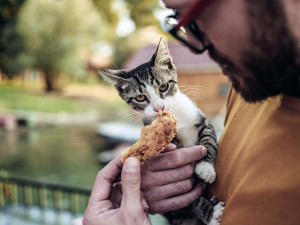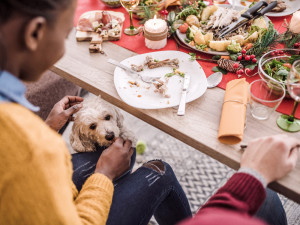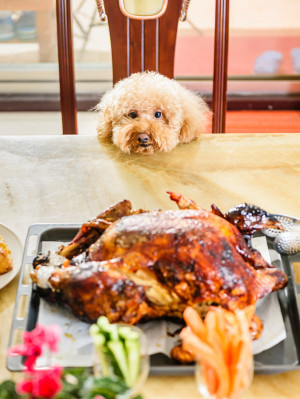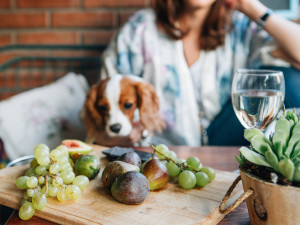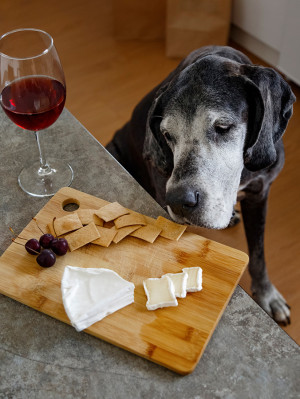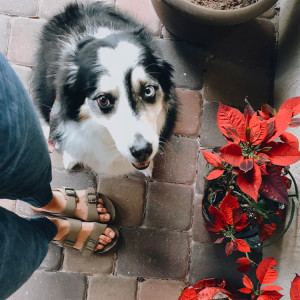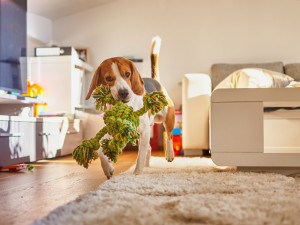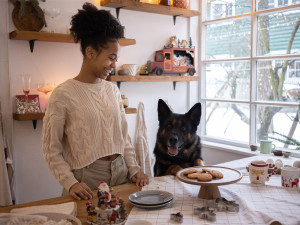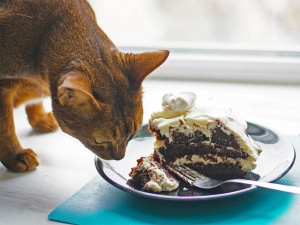Thanksgiving and Christmas Foods That Are Toxic To Pets
Here’s how to celebrate safely with your pet as you gather with friends and family.
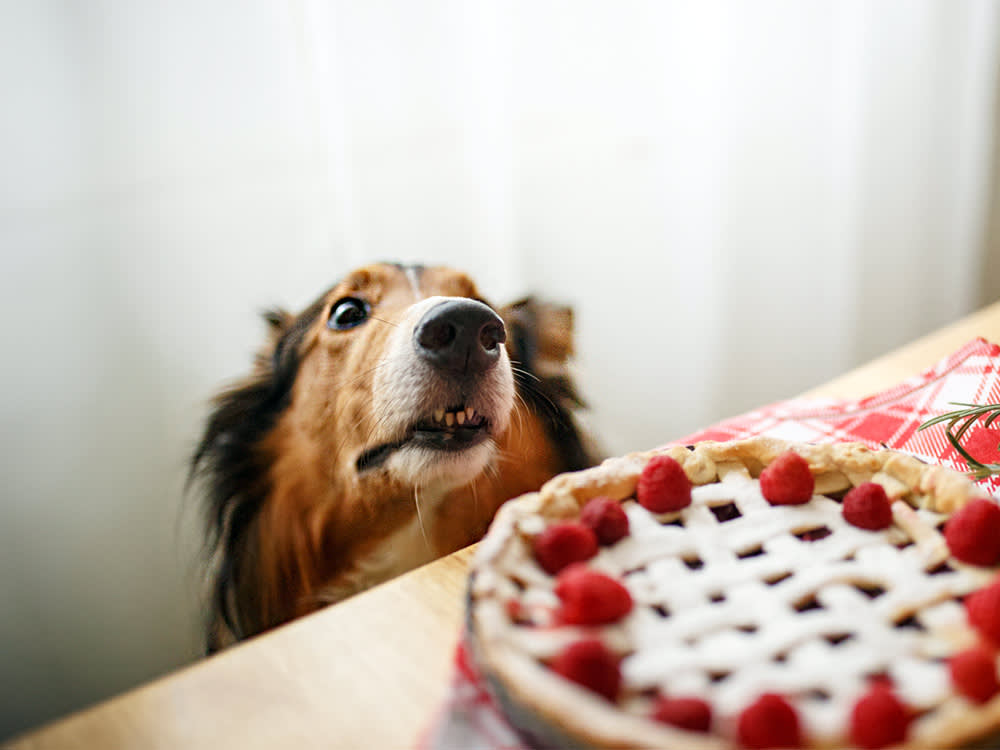
share article
In this Article:
Toxic Holiday Foods opens in a new tab Toxic Thanksgiving Foodsopens in a new tab Toxic Christmas Foodsopens in a new tab Signs Your Pet Has Ingested Something Dangerous opens in a new tab What to Do If You Suspect Your Pet Has Eaten Something Dangerousopens in a new tab How to Keep Your Pet Safe During The Holidaysopens in a new tab
Whether you want to plan a special treat for your pets, or they accidentally get into something they weren’t supposed to, knowing the dos and don’ts of holiday foods for pets will help you be prepared and proactive.
The holidays are here again, and it’s time to eat, drink, and get merry with the ones you love; including your pets. How can you safely include your dog or cat in the festivities? Be prepared. Think about what foods and drinks might be present at your gatherings and know which ones pose a risk to your dog opens in a new tab and/or catopens in a new tab. That way, you can be proactive about keeping dangerous foods out of reach. The list of foodsopens in a new tab to avoid includes chocolateopens in a new tab, grapes, raisins, onions, garlic, macadamia nuts, fatty foods, meat bones, alcohol, dairy products, and more.
Finally, the holidays can be chaotic, boisterous, and even stressful for both pets and people, so while you’re making plans for your pet, consider their emotional health as well. Be sure to provide your pet with plenty of exercise, mental enrichmentopens in a new tab, and opportunities to retreat to their own safe space if things get a little too extra for them. Unfortunately, you don’t get to retreat with them.
Everyone’s holidays look a little bit different, and we all have our favorite recipes that we like to rely on, so determining which ones may be unsafe for your pets will also vary from one celebration to the next. There are some general guidelines that you can use to help determine what foods to avoid. If in doubt, play it safe and avoid sharing foods with your pets that may be questionable. And of course, accidents happenopens in a new tab. If your pets get into something you know isn’t safe, take action quickly and contact your vet right away. Here are some holiday-specific points to keep in mind:
What are the most common holiday foods that are dangerous for pets?
Holiday foods tend to be especially decadent, so this can make them more dangerous for pets than our everyday meals. These dishes may contain specific toxic ingredients, as well as high fat and salt contents. Certain preparations may include choking hazards or inedible decorative elements. Below are some specific dishes you may encounter on the holidays.
Popular Thanksgiving foods that are toxic to pets
Turkey with skin and bones: The smell of roasting turkey will permeate the entire house and leave your pets drooling for a taste. Beware of sharing any turkey with skin on it, which is very fatty and can cause digestive upset or more serious pancreatitisopens in a new tab. Also, never share bones of any kind with your pets; these can be a choking hazard and can cause serious problems in the digestive tract if they get stuck along the way, leading to intestinal blockages or severe constipation.
Stuffing: Also called dressing depending on where you celebrate, everyone has a slightly different recipe for this savory side. In most cases, the recipe will include some combination of butter, garlic, onions, and/or leaks in addition to the vegetables, bread, and/or meat. Unfortunately for your pets, garlicopens in a new tab, leaks, and onions are all considered toxic. They are all members of the Allium family of plants, which can cause hemolytic anemia in cats and dogs, a serious illness. As if that’s not enough, the butter used to make stuffing is also very high in fat, which can cause digestive upset for many pets, including vomitingopens in a new tab, and/or diarrheaopens in a new tab, and some dogs can also get more serious pancreatitis as a result.
Mashed potatoes: A classic staple, mashed potatoes taste best when made with some combination of butter, milk or cream, and maybe garlic and/or chives. Sadly, you guessed it, none of these are good for the four-legged diners.
Pies: No feast is complete without dessert, but unfortunately, most of these are not pet-friendly. Common pie ingredients that are not safe for your pets include loads of butter and sugar. High-sugar foods can cause blood sugars to spike, which is especially problematic for diabeticopens in a new tab pets, but also unhealthy for all pets. Cats are especially sensitive to foods high in sugar because they are obligate carnivores and cannot break down sugar the way we do. Additionally, some pies may have especially toxic ingredientsopens in a new tab if they also include chocolate or nuts, such as walnuts or macadamia nuts. In general, it is best to avoid sharing any prepared desserts with your pets.
Popular Christmas foods that are toxic to pets
Prime rib: Red meats like prime rib, roast beef, and steak are common centerpieces to a Christmas feast and will likely attract your pets’ full attention. These tend to be fattier cuts of meat, which can put your pets at risk for digestive upset and pancreatitis. Additionally, any dish that contains bones, skewers, toothpicks, or other sharp and inedible accoutrements are especially dangerous for pets due to the risks of injury, choking and/or intestinal blockagesopens in a new tab.
Green bean casserole: From the name you might be wondering, What is so dangerous about a little green bean? Actually, plain green beans can be a great snack, however, these casseroles contain high fat dairy products such as milk, cream, and/or cheese. We know at this point that high-fat foods are a no-no, but did you know dairy should be avoided, too? Cats and dogs do not have adequate amounts of the enzyme lactase needed to digest dairy, so too much of it can cause a range of tummy troubles, including gas, bloating, and/or diarrhea. And to top it all off, a classic green bean casserole is sprinkled with crispy fried onions, another toxic ingredient.
Eggnog: This one may be more obvious because it contains alcohol, a known toxin to dogsopens in a new tab and cats. It also contains lots of sugar and heavy cream, both of which are unhealthy for your pets. To add to that, eggnog may contain undercooked eggs which increases the risk of certain food-borne bacteria, such as Salmonellaopens in a new tab. And finally, if you weren’t convinced yet, nutmeg is toxic to cats, too.
Yule log cake: Also called bûche de Noël, this is a beautiful, decadent, chocolate dessert that will bring families together, as long as you keep it out of reach of your pets. Chocolate is toxic to both dogs and cats and should be completely avoided. Small amounts will cause gastrointestinal signs, such as vomiting and diarrhea, while larger amounts can cause more serious seizuresopens in a new tab and even heart failure.
Why are these foods dangerous for pets?
There are many different reasons that foods are dangerous for pets. From these examples, you can see that many contain toxic ingredients. It is not always obvious what ingredients are used in a recipe when looking at the final product, so check with the cook if you have any questions. Other foods are dangerous because they are high in fat or contain large amounts of dairy and/or sugar, which are difficult for our pets to digest. Finally, some foods may be dangerous because they can be a choking hazardopens in a new tab or put pets at risk for intestinal blockages. There are many considerations to keep in mind, and as a general rule, plain, whole foods like certain fruits, veggies, or lean meats, are often the safest choice since they only contain one ingredient.
What are the signs that your pet has eaten something dangerous?
The signs will vary since there are many possible dangers with different effects on the body. The first sign may be that you notice your pet sneaking off with a mouthful of something, or you find evidence of the theft, such as torn wrappers, crumbs, or a missing bite in the main course. If you identify a toxin in something your pet ate right away, that is the best case scenario because you can take actionopens in a new tab before they show any signs of illness.
In many cases, however, you may not know your pet got into anything until they start acting sick. Some of the initial signs of illness may be that they retreat and seem less interested in affection or play. They may skip eating their own food, and/or act more lethargic. This may progress to more specific signs of illness including drooling, vomiting, and/or diarrhea. Some toxins have very specific effects so anything that seems unusual is worth documenting and mentioning to your vet, especially if you are unsure of what they might have eaten.
What should I do if I think my pet has eaten something dangerous?
First, contact your veterinarian and a pet poison hotline right away. This can help you determine how serious the risk is depending on what your pet ate, how much they ate, and their size. They will be able to best advise you on your next steps. In some cases, you may need to go straight to a veterinary emergency clinic for treatment right away, while other situations may allow you to take a wait-and-see approach. There are so many variables to consider that no two situations will be the same and each pet will need to be assessed based on the specific toxin ingested and their risk factors.
How to keep your pet safe from dangerous holiday foods
The best defense is a good offense, not just during the family football game, but also in taking precautions for Thanksgiving and Christmas for your pets. Think about where your pets can safely hang out while the food is cooked and served. Maybe this means giving them a safe space in another room, or assigning one person to be in charge of supervising the pets if you will be occupied with other tasks.
Plan to keep the most toxic foods and drinks far out of reach of your pets and ask your guests to do the same. Avoid using low coffee tables to serve or eat these foods, keeping all trash tightly sealed up, and reminding guests not to sneak table scraps to the pets. If you are starting your holiday prep way in advance, you can also work on teaching your pets cuesopens in a new tab to leave itopens in a new tab, and/or mat trainingopens in a new tab them so they have good alternatives to counter surfing and/or begging. Finally, be sure to give your pets something they can enjoy, which will keep them busy and hopefully out of trouble. This might be a special toy, a food puzzleopens in a new tab, or a sampling of safe holiday foods they can indulge in.
Are there any holiday foods I can share with my pets?
Luckily, there are holiday foods that you can safely shareopens in a new tab with your pets. It is always important to keep these treats to a minimum; any big change in diet can lead to digestive upset. Also, dogs and cats really need to eat a balanced diet that is intended for them, so too many treats can fill them up without providing the nutrients they really need. That said, there are many classic holiday foods for dogs and cats, including plain roasted sweet potatoesopens in a new tab, carrotsopens in a new tab, string beans, plain white meat turkeyopens in a new tab, and pumpkin, along with many other fruits and vegetablesopens in a new tab. And if you want to share a Christmas treat with your dog or cat, consider offering them plain white meat chicken, fruits (banana, apples, and berriesopens in a new tab), or even a small amount of breadopens in a new tab, as long as it is fully cookedopens in a new tab. If you have any doubt as to whether a particular food is safe to share, be sure to consult a poison control hotline or speak with your veterinarian. With these safety measures in place, you can merrily share your Christmas dinner with your dog or cat and let peace prevail in your home.
FAQs (People also ask):
Can pets have any special holiday treats?
Pets can have holiday treats as long as they are non-toxic foods such as plain fruits, vegetables or lean meats that are known to be safe for them. All treats should be shared in moderation to avoid weight gain, digestive upset, and nutritional imbalances.
Can pets consume turkey?
Yes, plain white meat turkey is OK in small amounts. They should not eat turkey skin, which is high in fat, any turkey bones, or any meat that has spices, butter, or other seasonings, which may be dangerous for them.
Should I be concerned about holiday decorations and plants?
Yes, it is very important to keep your pets safe around these items, too. Shiny, mobile decorations are irresistible, especially to cats, but these can cause serious problems if they are swallowed. Many plants are also toxic to pets, including peace liliesopens in a new tab, mistletoe, poinsettiasopens in a new tab, and amaryllis, all of which are popular gifts and decorations around the holidays.
References:

Dr. Amy Fox, DVM
Amy Fox, DVM is a small animal veterinarian in New York City. A lifelong animal lover, Dr. Fox studied biology in college and then worked as a veterinary nurse before pursuing veterinary school at Cornell University. She has worked in many different settings including shelter medicine, emergency medicine, general practice, and animal cruelty and forensics. She is especially interested in nutrition, preventative medicine and care for senior pets. Dr. Fox also enjoys writing about veterinary medicine and teaching. In her free time she loves to cook, garden, and go for long runs.
Related articles
- opens in a new tab
Can Dogs Eat Grapes?
The answer is no, no, no, and here’s why.
- opens in a new tab
Can Dogs Eat Cheese?
We know they want to — but how much is safe?
![Large black and white dog sitting next to Poinsettia plants.]() opens in a new tab
opens in a new tabAre Poinsettias Toxic For My Dog?
Everything you need to know about the notorious plant.
![Beagle dog fetching a green rope in a dog-proofed living room.]() opens in a new tab
opens in a new tabHow to Dog-Proof Your Home
Our room-to-room guide to get your house in dog-safe shape.
![woman and dog smiling during the holidays]() opens in a new tab
opens in a new tabHow to Help Your Dog Enjoy the Holidays
Here are fives tips on how to keep your dog entertained (and safe) this holiday season.
- opens in a new tab
Can Cats Eat Chocolate?
No, no, no. Absolutely not. Here’s why.
